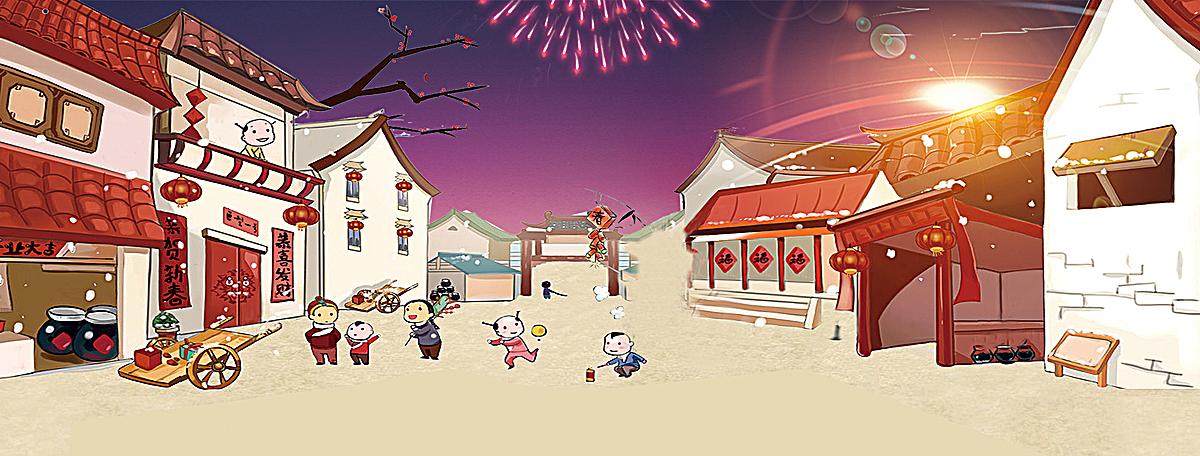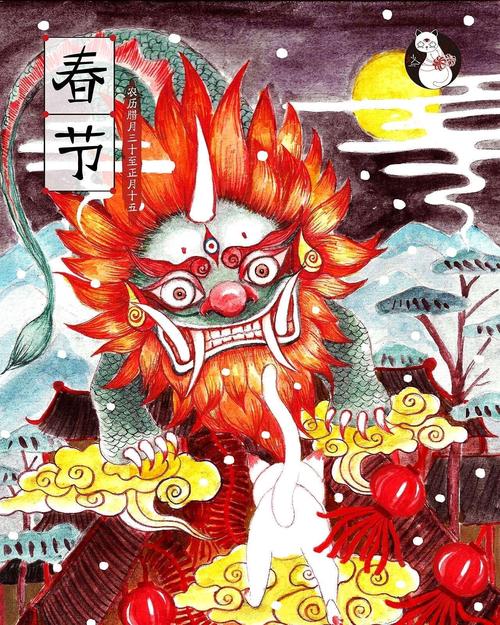 Of all the traditional Chinese festivals, the Chinese New Year was perhaps the most elaborate, colorful, and important. This was a time for the Chinese to congratulate each other and themselves on having passed through another year, a time to finish out the old, and to welcome in the new year. Common expressions heard at this time are: GUONIAN to have made it through the old year, and BAINIAN to congratulate the new year.
Of all the traditional Chinese festivals, the Chinese New Year was perhaps the most elaborate, colorful, and important. This was a time for the Chinese to congratulate each other and themselves on having passed through another year, a time to finish out the old, and to welcome in the new year. Common expressions heard at this time are: GUONIAN to have made it through the old year, and BAINIAN to congratulate the new year.
Like all Chinese festivals, the date of the Lunar New Year is determined by the lunar calendar rather than the Western calendar. Its origin is too old to be traced, but many believe the word Nian, which means"year", was the name of a beast that preyed on people on the eve of a new year.
In one legend, the beast, Nian, had the power to swallow up all the people in a village in one big bite. Village people were very scared of Nian. One day, an old man came to the villagers' rescue, offering to subdue Nian. The old man asked Nian,"I know you can swallow people, but can you swallow other beasts of prey instead of people who are by no means your worthy opponents?"Nian accepted the old man's challenge and swallowed the beasts that had harassed the villagers and their farm animals for years. At the end of the legend, the old man disappeared riding off on Nian. In this legend, the old man turned out to be an immortal god. In the end, Nian is gone and the other beasts of prey are scared into hiding in the forests. The villagers can once again enjoy their peaceful life.

The legend goes on to say before the old man left, he told the villagers to put red paper decorations on their windows and doors at each year's end in order to keep Nian away. It is believed Nian is afraid of the color red.
From then on, the tradition of observing the conquest of Nian is carried on from generation to generation. The term"Guo Nian", which means"Survive the Nian" became"Celebrate the Year" and the word"guo" in Chinese means both"pass over" and"observ".
The custom of putting up red paper and lighting firecrackers to scare away Nian continues today. As part of the the Lunar New Year celebration, people buy presents, decorations, special foods and new clothing. Railroad stations throughout China are filled with travelers who take their vacation days around New Year to return home for a family reunion.
Days before the Lunar New Year celebration, Chinese families are busy giving their home a thorough cleaning. It is believed the cleaning sweeps away bad luck and makes the house ready for good luck to enter. All brooms and dust pans are put away on New Year's Eve so good luck cannot be swept away.

In many homes, doors and windowpanes get a new coat of red paint. The home is decorated with paper-cuts and poems called couplets of "happiness","wealth","longevity" and"satisfactory marriage with children".
The Eve of Lunar New Year's supper is a feast with all the members of the family getting together. One popular food is"jiaozi" which are dumplings boiled in water. After dinner, the whole family stays up all night playing cards, board games or watching TV programs dedicated to the Lunar New Year's celebration. Lights in the house are kept on during the whole night. At midnight, the sky is lit up by fireworks which symbolize the sending out of the old year and the welcoming in of the new year.
The public holiday for Lunar New Year lasts 3 days in China, but the festival traditionally lasts till the 15th day of the lunar month and ends with Lantern Festival. Here, houses are decorated with colorful lanterns, and yuanxiao is eaten.
Chinese Lunar New Year customs vary from place to place in China because China is a big country geographically, demographically and ethnically. But the spirit underlying the diverse celebrations of the Lunar New Year is the same, a sincere wish of peace and happiness for family members and friends.




